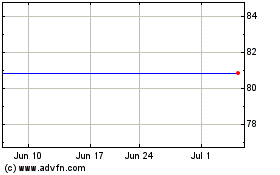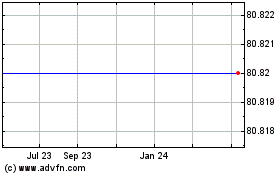Medical-Devices Sector Could Face Tougher Regulatory Pathway
February 09 2010 - 11:37AM
Dow Jones News
As the Food and Drug Administration reviews the way it approves
medical devices, companies are girding for changes that could make
it tougher and more expensive to roll out new products.
The FDA, under its new leadership, has toughened its image. Amid
this atmosphere, device makers are particularly focused on a review
of a fast-track approval pathway known as 510(k) that has drawn
criticism for leniency.
"I think that one has to believe that the 510(k) pathway is
going to get tightened up and that the processes are going to be
rigorous," David Dvorak, president and chief executive of Zimmer
Holdings Inc. (ZMH), said recently.
He expects "some adjustments but nothing that would
fundamentally change how we think about research and development
within our sector."
Zimmer is a big manufacturer of orthopedic products like
replacement hips and knees, which are typically cleared through the
quicker review process. The 510(k) pathway, also known as the
"premarket notification" process, doesn't require the same level of
medical evidence as a full "premarket approval," or PMA review,
making it faster and cheaper.
The 510(k) process is intended for new products that are similar
to items already approved. Most medical devices are cleared this
way, but the FDA has drawn flak for how it interprets the
rules.
After the FDA issued a self-critical report in September about
the approval process for a ReGen Biologics Inc. (RGBO) knee device,
the agency asked the influential Institute of Medicine to review
the 510(k) process. That review is expected to conclude in March
next year.
The FDA also tapped an internal working group with reviewing
ways to strengthen the program and is holding a public meeting to
discuss 510(k) challenges on Feb. 18. The review process was
launched more than 30 years ago to make available safe and
effective devices while promoting industry innovation, the FDA
noted.
"During the past three decades, technology and the medical
device industry have changed dramatically, making it an appropriate
time for the FDA to review the adequacy of the premarket
notification program in meeting these two goals," the agency said
when it announced this month's meeting.
Wells Fargo sees potential system changes later this year and
next that could take a financial toll.
"We believe the FDA will require more data for approval of
devices in general and this is likely to increase the cost of
bringing new devices to market," analyst Larry Biegelsen said in a
research note.
The industry also anticipates changes.
"Probably like everybody else, we're assuming that the
requirements for some of the products will be a little more
stringent," Stephen MacMillan, chairman and chief executive at
Zimmer rival Stryker Corp. (SYK), said during his firm's recent
earnings call.
Health-care giant Johnson & Johnson (JNJ) has a huge devices
business, including an orthopedics unit that competes with Stryker
and Zimmer. Chairman and Chief Executive William Weldon said on
J&J's call that the overall FDA regulatory environment--for
drugs, devices and consumer products--will get tougher.
FDA changes include new top-level leadership. The Senate
confirmed Margaret Hamburg as the new FDA commissioner in May last
year. More specifically for device companies, Jeffrey Shuren took
over as director of the agency's Center for Devices and
Radiological Health in January after becoming acting director in
September.
In a recent interview, Medtronic Inc. (MDT) Chairman and Chief
Executive William Hawkins said regulatory changes aren't unexpected
when FDA adds new leaders, and that it's part of the business cycle
for device companies.
Medtronic and other companies making high-tech heart implants,
such as Boston Scientific Corp. (BSX) and St. Jude Medical Inc.
(STJ), already use the more stringent regulatory pathway for such
products. That said, they aren't immune to regulatory changes.
A costlier path to market will be particularly hard on small
companies, said Tracy Lefteroff, who leads the life sciences
practice at PricewaterhouseCoopers LLP. While big companies can
digest such costs, they often rely on acquisitions of small
companies that incubate new technology, he said.
-By Jon Kamp, Dow Jones Newswires; 617-654-6728;
jon.kamp@dowjones.com
SJM (NYSE:STJ)
Historical Stock Chart
From Aug 2024 to Sep 2024

SJM (NYSE:STJ)
Historical Stock Chart
From Sep 2023 to Sep 2024
